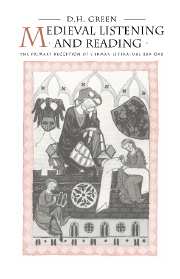Book contents
- Frontmatter
- Contents
- Preface
- List of abbreviations
- PART I Preliminary problems
- PART II Three modes of reception
- PART III Conclusions
- 9 Literacy, history and fiction
- 10 Recital and reading in their historical context
- Appendix Middle High German ‘lesen’ = ‘to narrate, recount, tell’
- Notes
- Bibliographical index
- Index of names
10 - Recital and reading in their historical context
Published online by Cambridge University Press: 04 September 2009
- Frontmatter
- Contents
- Preface
- List of abbreviations
- PART I Preliminary problems
- PART II Three modes of reception
- PART III Conclusions
- 9 Literacy, history and fiction
- 10 Recital and reading in their historical context
- Appendix Middle High German ‘lesen’ = ‘to narrate, recount, tell’
- Notes
- Bibliographical index
- Index of names
Summary
In the last chapter we were concerned with the part played by history within the relationship of the spoken to the written word and with the change in the conception of history which literacy could bring about. In this chapter we must turn the coin, looking at the position of orality and literacy within history, in their historical dimension in Germany from 800 to 1300.
Historical factors in the rise of vernacular written literature
In Chapter 2 we followed the emergence of written German to the Carolingian period, but must now continue this to about 1300. This confronts us with the problem of ‘die große Lücke’ in medieval German literary history, the fact that OHG texts start just before 800, but largely cease from about 900 so that, with the exception of Notker, we know of no written texts until about 1060, when they start again, with no further interruptions. This gap of one and a half centuries has called forth explanations, none of which is satisfactory. Ehrismann conceals the problem by inserting into his survey of OHG texts Latin ones written in Germany in the tenth and eleventh centuries, suggesting thereby a literary continuity, but not in the vernacular. A converse method is used by Stammler, who adduces oral tradition in the vernacular to bridge the gap between Otfrid and Ezzo, but the continuity proposed is one of literary production in German, not of written literary production.
- Type
- Chapter
- Information
- Medieval Listening and ReadingThe Primary Reception of German Literature 800–1300, pp. 270 - 315Publisher: Cambridge University PressPrint publication year: 1994



